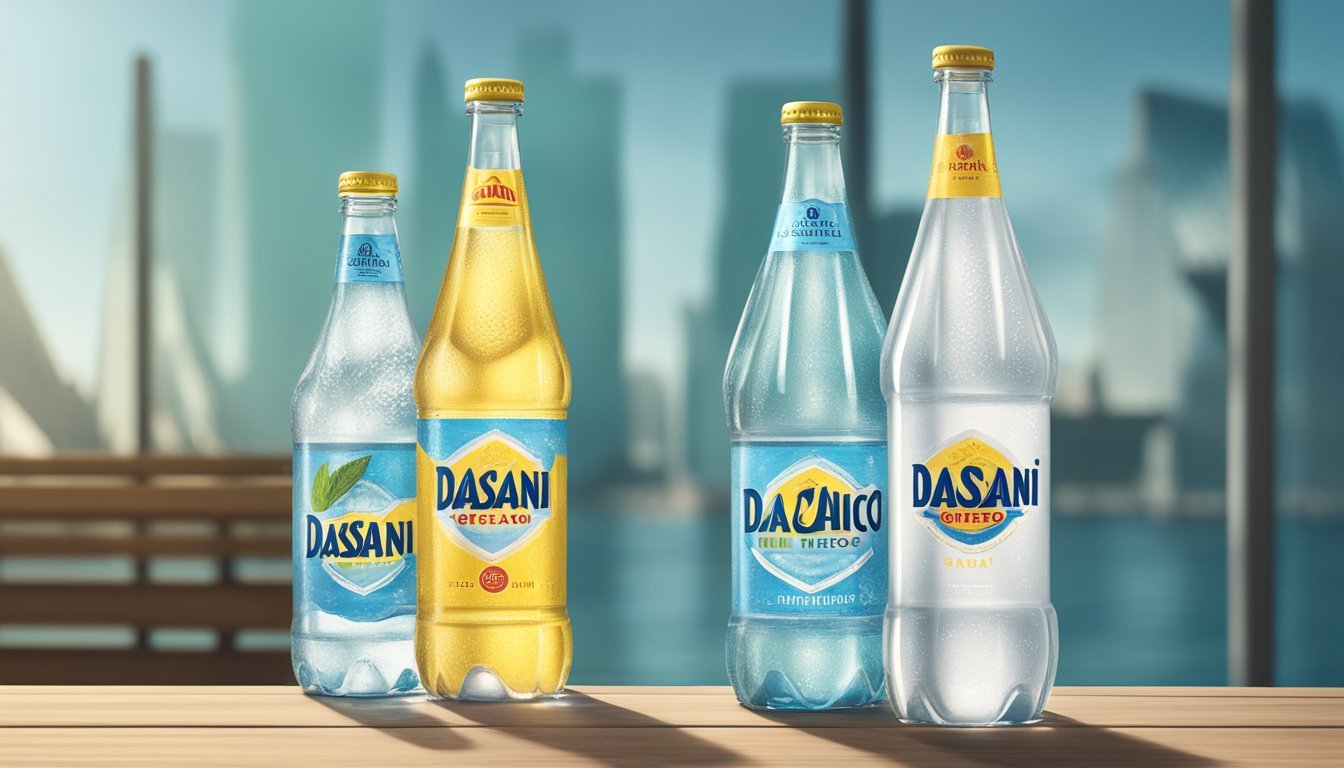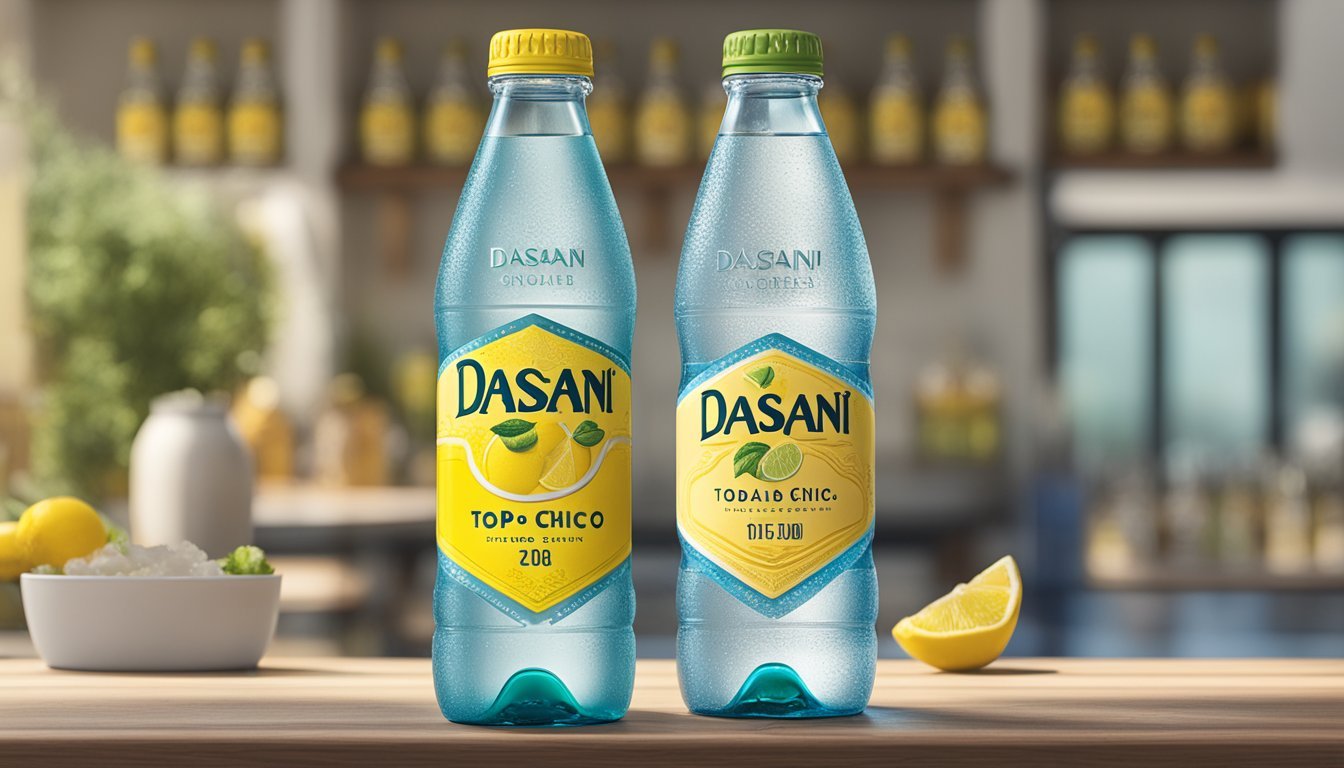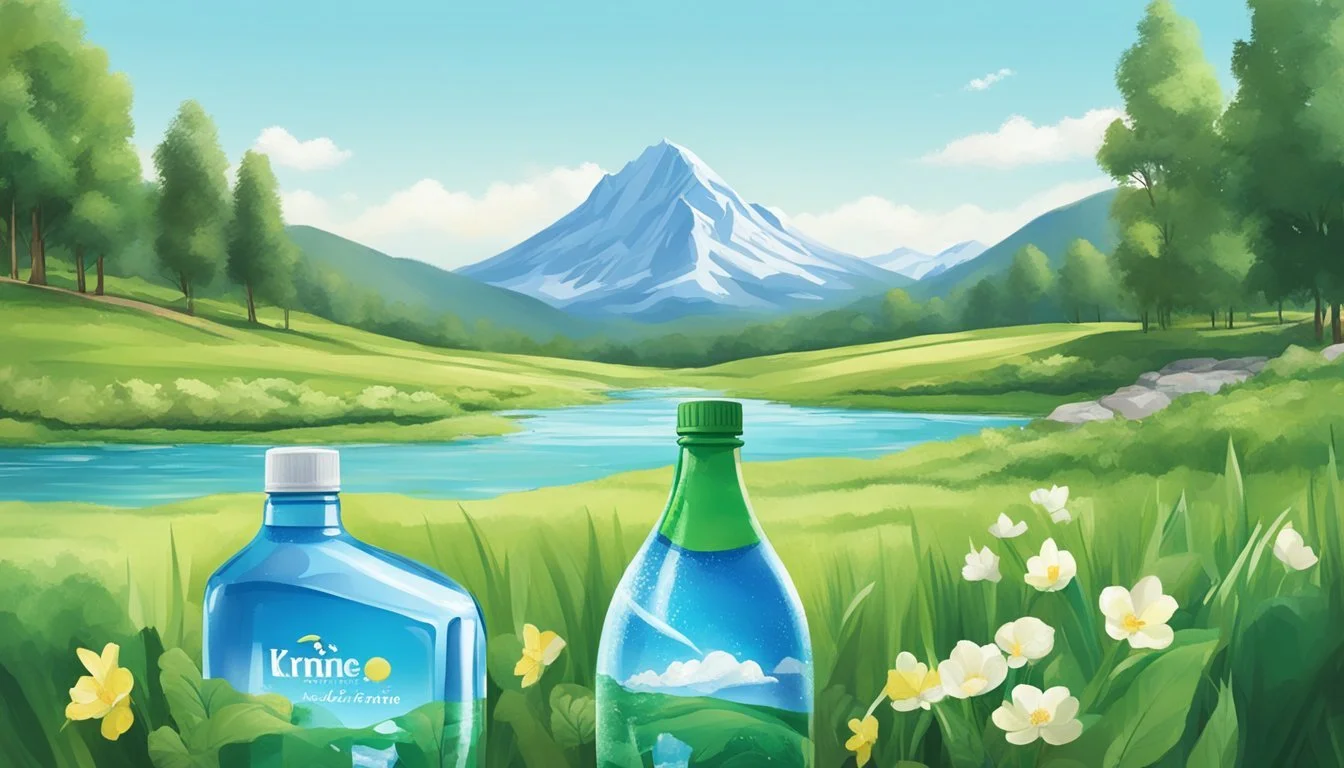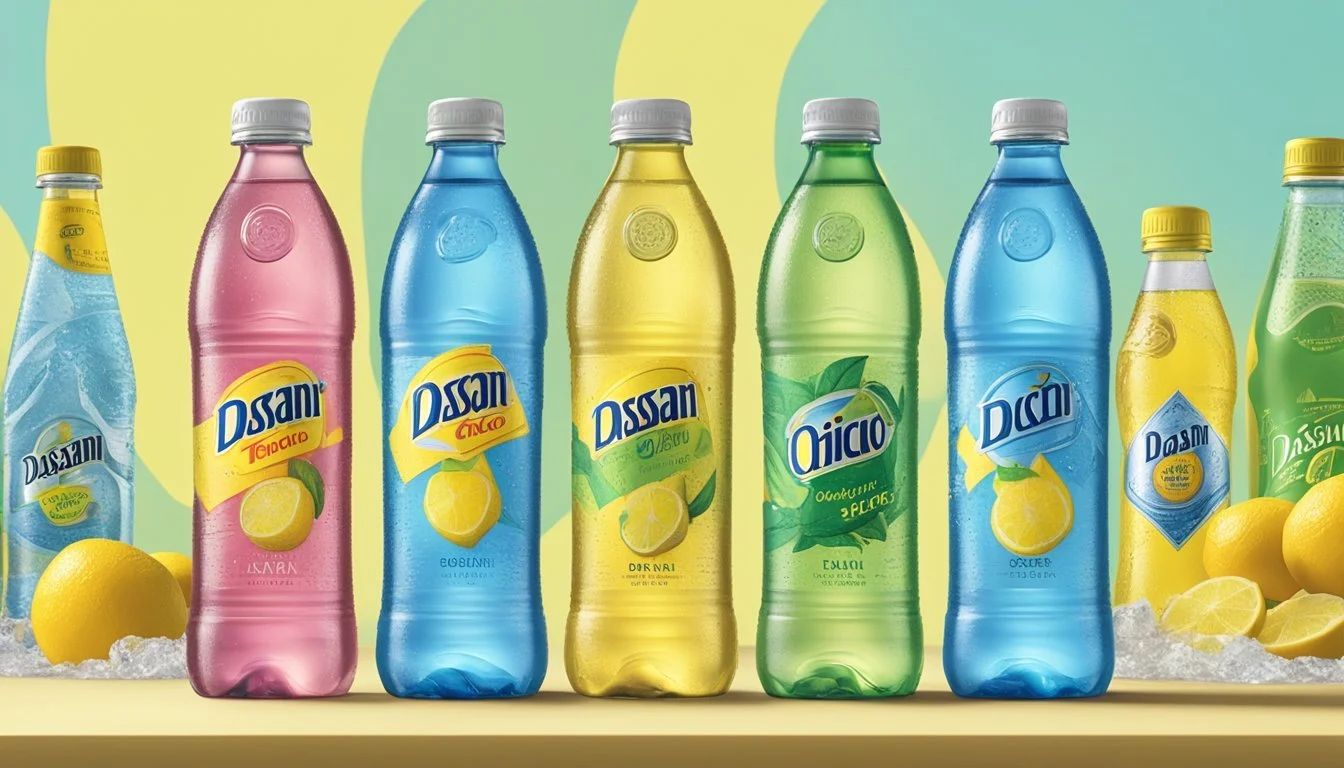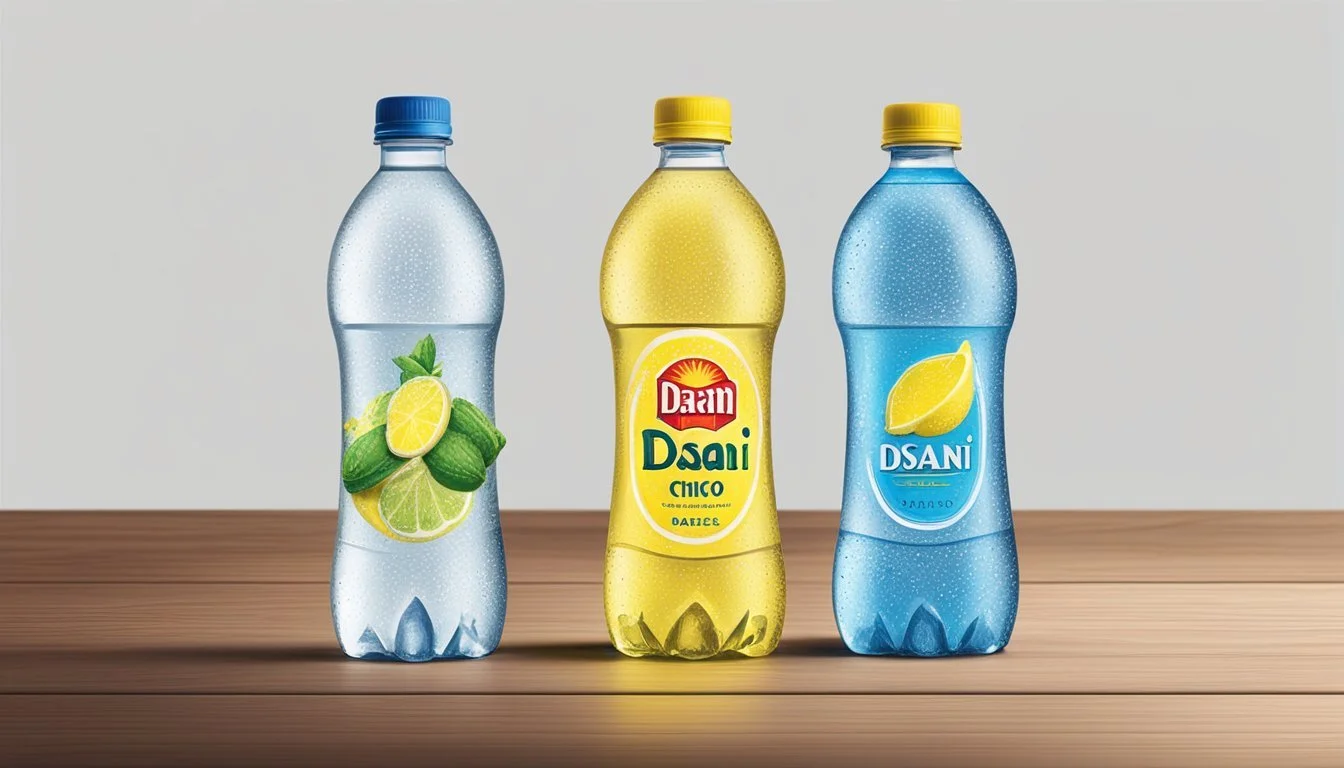Dasani vs. Topo Chico
Unveiling the Best Bottled Water Choice
In the world of bottled water, consumers are often faced with a multitude of choices, each brand offering its own unique taste, source, and purported health benefits. Among these numerous options, Dasani and Topo Chico stand out for different reasons. Dasani, a product of the Coca-Cola Company, is well-known for its wide availability and is often the subject of debate concerning its taste and production process. On the other hand, Topo Chico has carved out a niche for itself as a premium mineral water originating from Monterrey, Mexico, lauded for its effervescence and taste.
The growing concerns about the environmental impact of bottled water and various health claims contribute to the discourse surrounding these brands. While Dasani has faced scrutiny over its filtration and addition of minerals, Topo Chico's mineral content and sourcing from a natural spring have been highlighted in its marketing approach. This contrast sets the stage for an examination of the two brands, taking into account the source of the water, the methods of processing, the taste profile of each, and the brands' positions in consumer expectations and market trends.
Deciding which bottled water is better between Dasani and Topo Chico depends on a combination of factors that go beyond just personal flavor preference. The comparison involves the consideration of the quality of the water source, production methods, environmental impact, and overall brand reputation. Each element contributes to the consumer's choice, making it a complex subject worthy of exploration for those seeking hydration solutions in a market overflowing with options.
The Essence of Bottled Water
In considering bottled water options like Dasani and Topo Chico, one must appreciate the nuances that distinguish them. Bottled water, generally sourced from springs or municipal supplies, often undergoes filtration and additional processes to meet quality standards.
Mineral content is a key differentiator, with some brands boasting natural minerals and electrolytes that occur during the water’s subterranean journey. Topo Chico, for example, is a mineral water recognized for its blend of calcium, magnesium, and other ions imperative for hydration and overall health.
Calcium and magnesium, present in various bottled waters, contribute to taste and have health implications. These minerals are essential for bone health and neuromuscular functions.
Calcium: Typically 14-25 mg/L
Magnesium: Often 5-50 mg/L
Bottled waters vary in pH levels, with alkaline water claiming benefits from a higher pH. Whether natural or artificially enhanced, alkaline water is said to better neutralize acid in the bloodstream.
Here is a brief comparison of mineral content in bottled waters:
Brand Calcium (mg/L) Magnesium (mg/L) Alkalinity (pH) Dasani Low Low Neutral Topo Chico High High Slightly Alkaline
In choosing between Dasani and Topo Chico, consumers weigh the mineral presence and the resultant benefits. While personal preference on taste plays a role, an informed choice considers these fundamental elements of the essence of bottled water.
Dasani vs. Topo Chico: The Brands' Background
Dasani, a brand of bottled water introduced in 1999, is a product of Coca-Cola. Its source is filtered municipal water that is then enhanced with a proprietary blend of minerals for flavor. Marketed as a pure and refreshing beverage, Dasani has established a global presence.
On the other side, Topo Chico derives its name from the Cerro del Topo Chico in Monterrey, Mexico. This brand boasts a legacy dating back to 1895, revered for its natural carbonation and a mineral composition that emerges from volcanic springs in northern Mexico.
Dasani:
Launched: 1999
Source: Municipal water
Enhancement: Mineral blend
Brand Owner: Coca-Cola
Topo Chico:
Launched: 1895
Source: Cerro del Topo Chico spring, Monterrey
Unique Feature: Natural carbonation
Origin: Mexico
While Dasani is known for its consistent taste and wide availability attributed to Coca-Cola’s distribution network, Topo Chico has carved a niche with its effervescence and regional heritage in Texas and Mexico. Despite their different sources, both brands have been subject to scrutiny regarding their environmental impact and production practices.
The former relies on advanced filtration and added minerals, positioning itself as an everyday, accessible choice. The latter commands a more premium position, owing to its unique origin and a loyal following that appreciates its taste and effervescence.
Taste Profile Comparison
When comparing Dasani and Topo Chico, one immediately observes the distinct profiles each water offers. Dasani, a product of The Coca-Cola Company, provides a clean, crisp taste with a note of dryness often linked to its mineral content. It's not sparkling; Dasani is a still water, purified and enhanced with a blend of minerals for flavor.
Topo Chico, on the other hand, has been synonymous with naturally carbonated mineral water since its inception. Sourced from Monterrey, Mexico, its effervescence is a signature trait, presenting a sharp fizz that elevates its refreshment factor. Topo Chico offers a range of flavors, with lime and grapefruit variations infusing a subtle fruitiness that complements its mineral taste.
The mineral composition in both plays a critical role in crafting their unique tastes:
Dasani: often includes minerals such as magnesium sulfate, potassium chloride, and salt, added post-purification.
Topo Chico: naturally infused with a variety of minerals from its spring source, contributing to its complex flavor profile.
For those seeking a zesty twist in their water, Topo Chico's lime and grapefruit flavors offer a vibrant alternative. This quality has also led to Topo Chico being a popular choice for cocktails, notably in “ranch water”—a simple, refreshing mix typically involving tequila, lime, and Topo Chico.
Here, the presence of minerals and carbonation level are the gatekeepers to the experience one can expect from Dasani and Topo Chico. While both waters have their loyal followings, Topo Chico is often praised for its sparkling water qualities and the subtle taste enhancements from its naturally occurring minerals.
Mineral Content and Health Effects
Evaluating the mineral content of bottled water is crucial for understanding its health implications. Dasani and Topo Chico offer differing mineral profiles that contribute to their overall health effects.
Dasani Mineral Composition
Dasani water, a product from The Coca-Cola Company, is known for its clean taste and the addition of minerals for flavor. The typical mineral composition includes magnesium sulfate, potassium chloride, and salt to enhance flavor. Although these added minerals provide a consistent taste, their concentrations are relatively low, with Dasani containing:
Calcium: insignificant amounts
Magnesium: 0-2 mg/L
Sodium: 0-30 mg/L
Potassium: 0-2 mg/L
Bicarbonate: not reported
These minimal mineral levels have a negligible effect on health and are primarily for taste.
Topo Chico Mineral Richness
Topo Chico stands out for its natural mineral richness due to its volcanic spring source, contributing to its renowned sparkling water profile. The mineral water composition of Topo Chico includes a significant amount of minerals per liter, such as:
Calcium: 2-50 mg/L
Magnesium: 0-14 mg/L
Sodium: 31-35 mg/L
Potassium: 1.5-11 mg/L
Bicarbonate: 103-278 mg/L
The higher levels of minerals like calcium and magnesium are beneficial for bone and heart health, respectively, while sodium and bicarbonate levels can aid digestion and hydration.
Bottled vs. Tap Water
When comparing bottled water to tap water, consumers typically consider cost, convenience, and quality. Bottled water, such as Dasani or Topo Chico, can be more expensive yet offers convenience. Tap water is subjected to strict EPA guidelines to ensure safety, but concerns about contaminants persist.
The Quality of Tap Water
Tap water in the United States is regulated by the Environmental Protection Agency (EPA), which enforces standards to ensure clean drinking water. Municipal water is typically treated with chlorine to kill bacteria and may contain trace amounts of contaminants like lead, primarily from older infrastructure. The EPA's guidelines aim to keep these at safe levels for consumption.
The Need for Bottled Water
Bottled water is overseen by the Food and Drug Administration (FDA), and people may opt for it when clean tap water is not readily accessible or if they distrust local water quality. Dasani, Topo Chico, and similar brands offer the convenience of portability and are often chosen for their perceived purity or mineral content. However, bottled water is significantly more expensive than tap water and may not be substantively different in quality.
Filtered Tap Water Alternatives
For those concerned about potential tap water contaminants, filtered tap water provides a cost-efficient alternative. Filters can remove or reduce substances like chlorine and lead, improving taste and potentially providing an extra layer of protection. Filtered water systems range from simple pitchers to complex under-sink units.
Water Type Cost Quality Control Tap Water Least expensive, typically billed through local utilities EPA regulated; may vary by locality Bottled Water More expensive per gallon; convenience of single servings FDA regulated; standardized quality, varies by brand Filtered Tap Water Initial investment for filters; nominal cost per gallon afterward Depends on filter type; can improve taste and remove certain contaminants
Environmental Considerations
When comparing Dasani and Topo Chico bottled waters, environmental considerations play a significant role. These encompass both the impact on plastic waste and pollution and the sustainability initiatives taken by these brands.
Plastic Waste and Pollution
Dasani: Dasani, a Coca-Cola product, has recognized the need to address plastic waste. The brand has made commitments toward sustainable packaging, including the introduction of aluminum cans and resealable aluminum bottles. These efforts aim to reduce the reliance on virgin PET plastic. Notably, Dasani has set a goal to remove the equivalent of 1 billion virgin PET plastic bottles from its supply chain within five years.
Topo Chico: Topo Chico’s bottles are predominantly glass, which offers a potential environmental advantage due to the recyclability of glass. However, glass is heavier and can contribute to increased carbon emissions during transportation.
Comparison Table: Packaging Materials
Brand Primary Packaging Material Notable Initiatives Dasani Plastic, Aluminum Introduction of aluminum cans, virgin plastic reduction goals Topo Chico Glass N/A
Sustainability Efforts of Water Brands
Dasani: In addition to packaging changes, Dasani has launched a line of hybrid bottles made with up to 50% recycled plastic and plant-based materials, moving the brand towards a more circular economy model. Coca-Cola, the parent company, has a broader goal to create a "World Without Waste" and aspires to collect and recycle a bottle or can for every one it sells by 2030.
Topo Chico: While Topo Chico has not explicitly stated its sustainability goals in the available data, its parent company Coca-Cola is involved in broader environmental efforts that would include Topo Chico. Being part of a large conglomerate like Coca-Cola means that it's likely subject to the same corporate sustainability policies and goals.
Comparison of Other Brands’ Environmental Strategies
Brand Packaging Material Sustainability Initiative Aquafina Plastic N/A Evian Plastic Carbon neutral pledge, 100% recycled bottles by 2025 Fiji Water Plastic Reduction in packaging materials, efforts to protect Fiji's ecosystem Icelandic Glacial Plastic Carbon neutral, sourced from Iceland Mauna Loa Volcano N/A N/A
It's evident that each brand's approach to environmental sustainability varies, with a mix of commitments to reducing plastic waste and improving recycling efforts. While Dasani has made tangible strides in reducing virgin plastic usage, Topo Chico may benefit indirectly from Coca-Cola's wider environmental goals. Other brands like Evian have overtly committed to becoming carbon neutral and using 100% recycled plastic in their bottling, setting a high standard within the industry.
Comparative Analysis of Water Brands
The beverage market presents a variety of bottled water brands, each with its unique selling points and consumer base. A comparison of Dasani and Topo Chico sheds light on market competition and evolving consumer preferences.
Main Competitors in the Market
The bottled water industry is highly competitive, with brands like Evian, Fiji, and Smartwater leading in market share. These brands are often touted for their distinct taste profiles and mineral content. Smartwater is vapor-distilled with added electrolytes, while brands like Fiji boast natural artesian sources. Dasani, a Coca-Cola product, is known for its purification process and added minerals for taste. Topo Chico, also owned by Coca-Cola, stands out with natural carbonation and mineral content from its source at Cerro del Topo Chico.
High-end brands like Voss and Acqua Panna cater to a luxury segment, often served in fine dining establishments. Essentia claims to offer higher pH levels, capitalizing on trends around alkaline water. San Pellegrino and Perrier, like Topo Chico, are preferred for their carbonation, appealing to those who seek a sparkling alternative to still water.
Conversely, brands like Poland Spring and Deer Park are staples for everyday hydration, with a focus on natural sourcing and regional distribution. Aquafina, PepsiCo's answer to Dasani, touts a rigorous purification process. In the realm of sparkling water, LaCroix has a strong hold on the market with its variety of flavors and no added sweeteners.
Consumer Preferences and Trends
The preferences of water consumers continue to evolve. Personal preference plays a pivotal role in brand selection, often influenced by taste, source authenticity, health benefits, and environmental impact. A water sommelier might advocate for the unique taste profiles of San Pellegrino or Perrier, while health-conscious consumers may lean towards Essentia for its alkalinity.
Trends also point to an increasing demand for sparkling waters, with Topo Chico, LaCroix, and Bubly gaining popularity. Consumers favor these options for their zero-calorie count and absence of artificial sweeteners, complementing a health-oriented lifestyle.
Online marketplaces like Amazon have made it easier for consumers to access a diverse range of water brands, often swayed by customer reviews and ratings. Sustainability is another growing concern, leading some consumers to favor companies with a commitment to environmental stewardship over others.
Safety and Quality Regulations
When comparing bottled water brands such as Dasani and Topo Chico, their adherence to safety and quality regulations is paramount. These regulations ensure the water is free from dangerous contaminants like lead, arsenic, and mercury, and meet or surpass standards set by authoritative bodies.
EPA and FDA Standards
The Environmental Protection Agency (EPA) and the Food and Drug Administration (FDA) play key roles in setting safety standards for drinking water. The EPA regulates tap water, while the FDA oversees bottled water. Both Dasani and Topo Chico must comply with these regulatory standards to ensure their products are safe for consumption. The standards cover a range of contaminants including:
Heavy metals: Lead, mercury, and arsenic which are toxic when consumed at high levels.
Chemical compounds: Such as bromate which can form as a byproduct during water disinfection processes.
Emerging contaminants: PFAS chemicals have become a concern, prompting some companies to invest in additional measures to reduce their presence in bottled water.
International Standards and Testing
In addition to EPA and FDA regulations, bottled water is also subject to international standards that dictate safe levels of various contaminants. Both Dasani and Topo Chico are global brands and thus may undergo testing beyond U.S. regulations to maintain widespread consumer trust. These tests can detect minute levels of contaminants like PFAS, ensuring they remain below the recognized safety thresholds as prescribed by:
International organizations such as the World Health Organization (WHO).
National standards of the countries where the water is sold.
Consumer Reports has been influential in testing bottled water brands for PFAS. Their findings have sometimes led to increased scrutiny and even class-action lawsuits when levels of contaminants have been found to exceed safety standards.
By adhering to stringent EPA, FDA, and international testing and standards, both Dasani and Topo Chico demonstrate their commitment to providing consumers with high-quality, safe bottled water.
Packaging and Branding
Dasani and Topo Chico stand out in the bottled water market, mainly due to distinct packaging and strong branding efforts. Dasani, a Coca-Cola brand, typically uses clear plastic bottles, recognizable by their blue labels and the company logo. The brand places significant emphasis on sustainability, with a history of initiatives like the PlantBottle rollout in 2009, aimed at reducing environmental impact.
Topo Chico, on the other hand, is often found in glass bottles, adding to its premium image. The glass packaging not only preserves the water's carbonation but also aligns with the brand's heritage appeal. Acquired by Coca-Cola in 2017, Topo Chico has maintained its classic branding, leveraging the nostalgic value of its original design to appeal to consumers.
Both brands have distinct visual identities:
Dasani:
Materials: Primarily plastic bottles.
Design: Simple, clean lines with blue and white color schemes.
Branding Strategy: Focused on sustainability and accessibility.
Topo Chico:
Materials: Mainly glass bottles, also available in plastic.
Design: Vintage, with colorful labeling.
Branding Strategy: Markets itself as an authentic, premium sparkling mineral water.
Topo Chico, having a presence in venues like Starbucks, leverages this partnership to strengthen its brand position. However, both Topo Chico and Dasani are subjects of extensive marketing campaigns by Coca-Cola, aiming to reach a broad audience and position themselves as leaders in the bottled water industry, as reported by sources like Business Insider.
The Role of Additives in Bottled Water
When it comes to bottled water, additives play a crucial role in both enhancing taste and ensuring the product's safety. Brands like Dasani, a product of The Coca-Cola Company, acknowledge the addition of minerals to improve flavor. These additives typically include magnesium sulfate, potassium chloride, and salt (sodium chloride).
Sodium is a common additive that contributes to the overall taste profile. While often present in minimal amounts, it is important to acknowledge its presence for individuals monitoring their sodium intake for health reasons.
Chlorine compounds, albeit more associated with tap water, may be used in the purification process of bottled water. However, they are not present in the water post-treatment, ensuring the taste remains unaffected. On the other hand, bromate, a by-product of disinfection, is not an intended additive and is strictly regulated due to its potential health risks.
Table of Common Additives in Bottled Water:
Additive Purpose Common Presence Magnesium Sulfate Enhance flavor Occasional Potassium Chloride Enhance flavor Occasional Sodium Chloride Enhance flavor & maintain quality Frequent Chlorine Compounds Used in purification (not a residual additive) Infrequent
In response to growing health and environmental concerns, some brands are addressing the presence of PFAS (per- and polyfluoroalkyl substances), which are synthetic chemicals that may contaminate water sources. Topo Chico, another popular brand, has reportedly taken steps to reduce PFAS levels in its mineral water significantly.
Consumers should feel confident about the bottled water they choose to drink, as products like Dasani adhere to regulations set by the Food and Drug Administration (FDA), ensuring additives do not pose a threat to health. The utility of additives in bottled water is to improve the consumer experience without compromising health standards.
Innovation and Technological Advancements
Innovation in bottled water brands like Dasani and Topo Chico reflects their commitment to enhancing the quality and sustainability of their products. These advancements range from purification processes to methods of carbonation.
Hydro-7 Purification Process
Dasani has developed its proprietary Hydro-7™ purification process, which is designed to remove impurities and deliver a clean, crisp taste. This multi-step filtration method utilizes state-of-the-art technology to ensure that the water meets high standards of quality. The Hydro-7 process involves the following steps:
Coagulation: This initial phase involves adding substances to the water that bind with contaminants and particles, making them larger and easier to filter out.
Flocculation: Once coagulated, the particles form larger clusters, known as floc, further preparing them for removal.
Sedimentation: The floc settles at the bottom, separating from the clear water above it.
Filtration: The clear water moves through various filters to remove any remaining microscopic impurities.
Disinfection: Water is treated to eliminate bacteria and other microorganisms.
Taste and Odor Remediation: Specialized processes are applied to improve the taste and smell of the water.
Addition of Minerals: Electrolytes are added for a distinctive taste, enhancing the overall experience for the consumer.
Naturally Carbonated Extraction
Topo Chico stands apart with its unique source of extraction, leveraging naturally carbonated water that comes directly from mineral springs. This natural carbonation process contributes to the refreshing effervescence and mineral content that the brand is known for. Not only does naturally carbonated water have a distinct taste, but the minerals also offer a different mouthfeel compared to artificially carbonated drinks. The significant minerals found in Topo Chico include:
Calcium: Important for bone health.
Magnesium: Essential for regulating muscle and nerve function.
Potassium: Crucial for cardiovascular health.
By utilizing naturally carbonated springs, Topo Chico is able to capture the essence of the mineral-rich earth, offering consumers carbonated water with a robust and earthy flavor profile.
Consumer Impact and Market Dynamics
The competition between bottled water brands Dasani and Topo Chico can be significantly influenced by consumer reactions to litigation and the fluctuations in brand loyalty and market share. These two elements reflect the ongoing dynamic in a highly competitive market.
Class Action Lawsuits and Public Perception
Dasani has faced public scrutiny and challenges, including class-action lawsuits alleging misleading marketing practices regarding the source and quality of its water. These lawsuits can impact consumer reports and influence public perception, which is a crucial factor for a brand's reputation. Additionally, when competitors see an opportunity amid controversy, they can garner a greater share of the market.
Brand Loyalty and Market Share
Topo Chico, with its history and unique product offerings like sparkling mineral water, has cultivated a strong brand loyalty that contributes to its market presence. Meanwhile, Dasani, despite setbacks, remains a significant player in the bottled water industry thanks to the backing of its parent company, Coca-Cola. The market share of both brands is a testament to their distinct strategies and consumer appeal. Business reports such as those by Business Insider provide insights into the financial performance and competitive positioning of these brands within the industry.
Conclusion
When comparing Dasani and Topo Chico, consumers are presented with two distinct choices in the bottled water market. Dasani, a product of The Coca-Cola Company, is known for its accessibility and consistent taste. Topo Chico, on the other hand, offers a unique mineral water experience hailing from Monterrey, Mexico, with a considerable history.
In deciding which is better, one must consider personal preference and intended use. Dasani may be suitable for those seeking a reliable, everyday hydration option with wide availability. Its taste is familiar and it serves as a no-frills choice for hydration.
Topo Chico appeals to those who prefer natural mineral water with a bit of carbonation, providing a refreshing experience. Its effervescence makes it a popular choice for consumers looking for a palate cleanser or a mixer in beverages.
Availability:
Dasani: Widely available in many regions.
Topo Chico: More exclusive with limited distribution.
Taste & Experience:
Dasani: Neutral profile, suitable for everyday use.
Topo Chico: Sparkling mineral composition offering a distinct taste.
In terms of environmental impact, both brands face criticism over the sustainability of bottled water. However, it is the responsibility of the consumer to weigh these factors in their purchasing decision. Each brand has its own merits, and the choice ultimately depends on individual preferences for taste, texture, and occasion of consumption.


